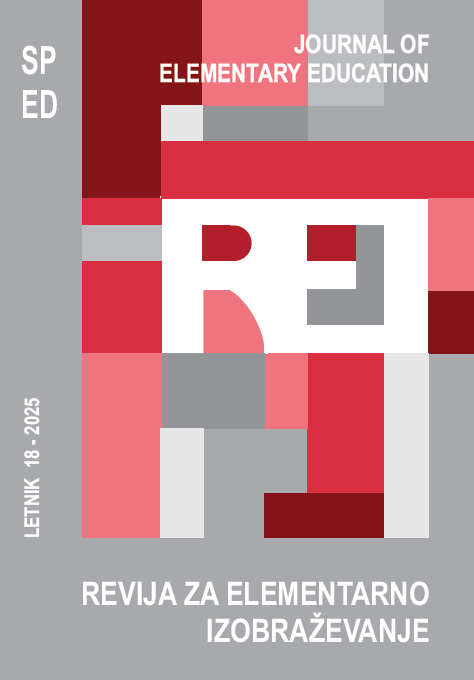Parents’ Perspectives on Stressors and Resources: Well-being and Social Support During Early Childhood Transitions
DOI:
https://doi.org/10.18690/rei.5394Keywords:
transition from home to ECEC setting, nursery and kindergarten settling-in, parental perspective, stressors and resources, sense of coherence.Abstract
The transition from familial to institutional early childhood education and care (ECEC) settings is a critical phase for both children and parents. In this study, we examined the stressors and resources affecting parents during nursery and kindergarten settling-in processes. Using Antonovsky’s concept of coherence as the theoretical framework, we conducted fifteen qualitative semi-structured interviews with parents and analysed the emotional, organisational, and social challenges they perceived as stressors and resources during the transition phase. The findings showed that a resource-oriented approach can reduce stress and support the emotional and social adjustment of both parents and children.
Downloads
References
Ahnert, L., Kappler, G., and Eckstein-Madry, T. (2012). Eingewöhnung in die Krippe: Forschungsmethoden zu Bindung stress und coping [Settling into daycare: research methods on attachment stress and coping]. In S. Viernickel, D. Edelmann, H. Hoffman, and A. König (eds.), Forschung zur Bildung, Erziehung und Betreuung von Kindern unter drei Jahren [Research on the education, upbringing and care of children under three years of age] (pp. 74–88). Reinhardt.
Ahnert, L., Eckstein-Madry, T., Datler, W., Deichmann, F., and Piskernik, B. (2023). Stress during transition from home to public childcare. Applied Developmental Science, 27(4), 320–335. https://doi.org/10.1080/10888691.2022.2070168
Antonovsky, A. (1997). Salutogenese: Zur Entmystifizierung der Gesundheit [Salutogenesis: demystifying health]. dgvt Verlag.
Bensel, J. (1992). Behavior of toddlers during daily leave-taking and separation from their parents. Ethology and Sociobiology, 13(4), 229–252. https://doi.org/10.1016/0162-3095(92)90024-X
Bowlby, J., Ainsworth, M., and Bretherton, I. (1992). The origins of attachment theory. Developmental Psychology, 28(5), 759–775.
Datler, W., Ereky-Stevens, K., Hover-Reisner, N., and Malmberg, L.E. (2012). Toddlers’ transition to out-of-home day care: Settling into a new care environment. Infant Behavior & Development, 35(3), 439–451. https://doi.org/10.1016/j.infbeh.2012.02.007
Dunlop, A.W., and Fabian, H. (2003). Editorial. European Early Childhood Education Research Journal, 11(Sup1), 2–4. https://doi.org/10.1080/1350293X.2003.12016700
Fabian, H., and Dunlop, A. W. (2007). Outcomes of good practice in transition processes for children entering primary school. Bernard van Leer Foundation.
Gath, M. E., Herold, L., Hunkin, E., McNair, L. J., Redder, B., Rutanen, N., and White, E. J. (2024). Infants’ emotional and social experiences during and after the transition to early childhood education and care. Journal of Early Childhood Research, 22(1), 88–105. https://doi.org/1–0.1177/1476718X231195706
Griebel, W., and Niesel, R. (2002). Co-constructing transition into kindergarten and school by children, parents and teachers. In H. Fabian and A. W. Dunlop (eds.), Transitions in the early years: Debating continuity and progression for young children in early education (pp. 64–75). Routledge.
Idan, O., Braun-Lewensohn, O., Lindström, B., and Margalit, M. (2019). Salutogenese: Der Kohärenzsinn in der Kindheit und in der Familie [Salutogenesis: the sense of coherence in childhood and family]. In C. Meier Magistretti, B. Lindström, and M. Eriksson (Eds.), Salutogenese kennen und verstehen [Know and understand salutogenesis] (pp. 189–198). Hogrefe.
Laewen, H.J. (1989). Zur ausserfamilialen Tagesbetreuung von Kindern unter drei Jahren: Stand der Forschung und notwendige Konsequenzen [On out-of-family day care for children under three years of age: the state of research and necessary consequences]. Zeitschrift für Pädagogik, 35(6), 869–888. https://doi.org/10.25656/01:14540
Laewen, H.J., Andres, B., and Hedervari, E. (2007). Ohne Eltern geht es nicht: Die Eingewöhnung von Kindern in Krippen und Tagespflegestellen [It doesn't work without parents: familiarising children with nurseries and childminders] (4th ed.). Cornelsen Scriptor.
Lam, M. S. (2014). Transition to early childhood education: Parents’ use of coping strategies in dealing with children’s adjustment difficulties in Hong Kong. Australasian Journal of Early Childhood, 39(3), 111–120. https://doi.org/10.1177/183693911403900314
Meier Magistretti, C. (2022): The Sense of Coherence in the Life Course. In: Mittelmark, M. B., Bauer, G., Vaandrager, L., Pelikan, J. M., Sagy, S., Eriksson M., Lindström, B., Meier Magistretti, C. (2022): The Handbook of Salutogenesis. (2nd ed.) (pp. 117–123). Springer, New York.
Malsch, A. M., Green, B., and Kothari, B. H. (2011). Understanding parents’ perspectives in the transition to kindergarten: What early childhood settings and schools can do for at-risk families. Best Practices in Mental Health, 7(1), 47–66.
Mayring, P. (2021). Qualitative content analysis: A step-by-step guide. Sage Publications.
Nystad, K., Drugli, M. B., Lydersen, S., Lekhal, R., and Buøen, E. S. (2021). Toddlers’ stress during transition to childcare. European Early Childhood Education Research Journal, 29(2), 157–182. https://doi.org/10.1080/1350293X.2021.1895269
Purtell, K. M., Valauri, A., Rhoad-Drogalis, A., Jiang, H., Justice, L. M., Lin, T.J., and Logan, J. A. (2020). Understanding policies and practices that support successful transitions to kindergarten. Early Childhood Research Quarterly, 52, 5–14. https://doi.org/10.1016/j.ecr–esq.2019.09.003
Rimm-Kaufman, S. E., and Pianta, R. C. (2000). An ecological perspective on the transition to kindergarten. Journal of Applied Developmental Psychology, 21(5), 491–511. https://doi.org/10.–1016/S0193-3973(00)00051-4
Sotiropoulou, E., Katsiada, E., and Bercovits, A. (2022). Educators’ views on parents’ contribution to the transition to nursery of children under the age of 3. International Journal of Education, 14(2), 83–95. https://doi.org/10.5296/ije.v14i2.20095
Spitz, R. A. (1960). Discussion of Dr. Bowlby’s paper. The Psychoanalytic Study of the Child, 15(1), 85–94. https://doi.org/10.1080/00797308.1960.11822569
Winner, A., and Erndt-Doll, E. (2009). Anfang gut? Alles besser! Ein Modell für die Eingewöhnung in Kinderkrippen und anderen Tageseinrichtungen für Kleinkinder [A good start is half the battle! A model for familiarising children with nurseries and other day-care facilities for young children]. Das Netz.
Downloads
Published
Issue
Section
License
Copyright (c) 2025 Eva Pölzl-Stefanec, Nina Gutmann

This work is licensed under a Creative Commons Attribution 4.0 International License.
